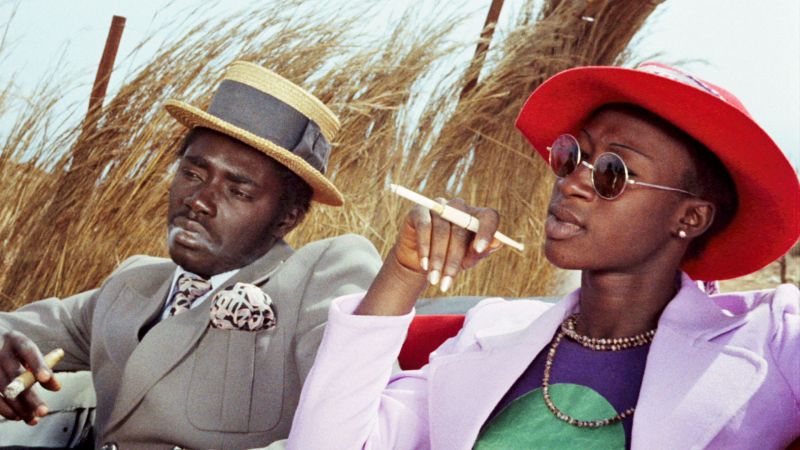Restored to digital format in 2008 by Martin Scorsese’s World Cinema Foundation (WCF), Djibril Diop Mambéty’s Touki Bouki (1973) deserves to be recognised as a global classic. Scorsese was on the mark in recognising its cultural importance, and its significance not just as an African film, but a truly unique, rebellious and frankly beautiful piece of cinema. Poet/Actor turned amateur filmmaker, Mambéty’s vision of fugitive love in a hybridized Senegal is an aesthetic triumph and marks unapologetically his political radicalism. Often regarded as his magnum opus, Mambéty paints a masterful image of domestic post-colonial Senegal; positioning mythicised Africa against the influence of post-colonial French modernity. Touki Bouki’s world is flawlessly constructed through montages of dream-like pastoral landscapes and sequences of robbery and theft carried out with effortless style. It tells the story of the anarchistic student Anta and cowherd Mory; renegade lovers on the run to Paris with dreams of building a new life away from the repression of their misunderstanding community. With frenetic camera work and a dauntless soundtrack, we see unfold before them a world of petty crime and flamboyant road trips, along the rural Senegalese coast and into the cityscape of Dakar.
In its time a commercial flop, there has been a resurgence of interest in Touki Bouki, or ‘The Hyena’s Journey’, primarily from the WCF’s preservation, but also in the eye of pop culture. The film was cited as the recent promotional inspiration for Beyonce and Jay-Z’s ‘On the Run II’ 2018 world tour, with the two global artists positioned as the iconic couple Anta and Mory. Paying stylistic homage to Touki Bouki has help reignite popular interest in this grievously overlooked film and drawn attention to its vibrant narrative and keen flair. One of the highlights in watching this is just how stylish and suave Mambéty can be – the young lovers on the run swagger effortlessly through Senegal with little consequence or resistance, more preoccupied with dressing the part of rich and successful Parisians and smoking cigars in front of their neighbours than with the practicalities of being on the lam. At times Touki Bouki can feel like a hyper fantasy; flickering from one crime to the next, the film is more like a series of aesthetic vignettes than a feature film. However, the thematic underpinnings centre it as a story not just of adolescent rebellion, but an expression of the collective fantasy of a nation. Mambéty crafts a highly political film about tradition and modernity, globalisation and the importance of dreams within national identity.
Some of the most compelling moments of this film are its tendencies towards magical realism; reminiscent of the Hispanic narrative tradition we are more likely to find nowadays in the films of Guillermo del Toro. Blurring mythology and reality, Mambéty equips fantasy with powerful political critique, engaging post-colonial African ritual with the fixation on modernity that came with Colonization. He finely explores the lines between Anta and Mory’s loyalties to African tradition, (most commonly expressed by the cow skull motif), and their obsessive fascination with Paris; the trappings of consumerist Europe. Although, there’s an unexpected sense of humour within this, and the culture clash of post-colonization becomes incredibly comical at points. For instance, the scenes where the older generation of Senegalese women slander and heckle after the reckless couple, or in the pretentious use of European fashions as social credence.
For those familiar with African cinema, it’s not your typical slow-paced social-realist cinema – Mambéty is clearly influenced by French New Wave technique, and the film is rife with jumpcuts, guerrilla camera work, and tounge in cheek dissonance between reality and the editing room. He also perfectly captures the infamous audacity of Godard’s characters in rebellious university student Anta and her delinquent boyfriend Mory during their starry-eyed and youthful revolt. The camera tracks their escapades with determined style, and at times proves cinematographically breath-taking. There’s something inexpressibly loveable about the two, no matter how immoral or cowardly their choices become, you can’t help but root for their success. Touki Bouki’s narrative falls somewhere between comedic but deeply sentimental, triumphant and defeated all at once, with Anta and Mory’s storyline eventually fractured by their differing loyalties and ambitions. It’s an absolute vision of a splintered nation, and one that remains crucially relevant in today’s political climate. In 2019, Touki Bouki sustains itself as a daring expression of conflicted identity and brazen revolution despite the 45 years since its initial release.
Touki Bouki was screened at the Attenborough Centre for the Creative Arts (ACCA) as part of its ongoing Cinema Club series. Tickets to upcoming screenings can be purchased from their website https://www.attenboroughcentre.com/events/

